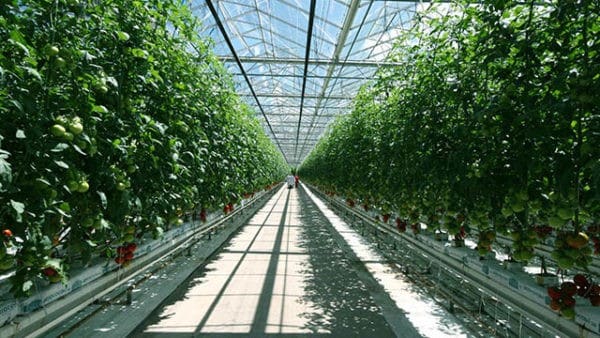What if Canopy Growth acquired Village Farms?

 Consolidation continues in the burgeoning North American cannabis market and one deal that makes a lot of sense, says Raymond James analyst Rahul Sarugaser, would be a merger between Canopy Growth (Canopy Growth Stock Quote, Chart, News, Analysts TSX:WEED) and Village Farms (Village Farms Stock Quote, Chart, News, Analysts TSX:VFF).
Consolidation continues in the burgeoning North American cannabis market and one deal that makes a lot of sense, says Raymond James analyst Rahul Sarugaser, would be a merger between Canopy Growth (Canopy Growth Stock Quote, Chart, News, Analysts TSX:WEED) and Village Farms (Village Farms Stock Quote, Chart, News, Analysts TSX:VFF).
In a company brief to clients on December 24, Sarugaser reiterated his “Strong Buy 1” for Village Farms while making the case for the acquisition.
Delta, BC-headquartered Village Farms is a greenhouse grower of vegetables, cannabis and hemp, with more than nine million square feet under glass in its three primary verticals: produce production and distribution in the US and Canada and through partner growers in Mexico, cannabis production and distribution in Canada via its subsidiary Pure Sunfarms (PSF) and hemp and hemp-derived CBD production and distribution in the US.
Village Farms’ share price had a rough 2019, along with the rest of the cannabis market, but the stock has picked it up in 2020, especially since the company gained full control of Pure Sunfarms in November (PSF was previously a 50/50 joint venture with Emerald Health). Village Farms is now up 90 per cent for the year and has gained 149 per cent since the start of November.
Over the last two trading days alone the stock gained almost 21 per cent. Reflecting on those recent gains, Sarugaser said nothing fundamental has changed with VFF to precipitate the spike but the analyst rhymed off a number of reasons why VFF should be outperforming its peer group, arguing that: Village Farms is a catch-up trade versus its Canadian and US cannabis peers based on relative undervaluation of VFF; the stock had a solid technical setup to start the week, one that “woke the algos,” according to Sarugaser; the stock caught the beginnings of a rally into the Georgia senate election on January 5; and the market’s anticipation of VFF’s first quarter fiscal 2021 results, which will feature its full 100-per-cent ownership of PSF.
Sarugaser wrote that none of those factors explains the surge in volume and price in VFF to close last week but the analyst did point to consolidation as potentially ramping up in the sector, boosted by the merger last week between Canadian heavyweight LPs Aphria and Tilray. And on that topic, Sarugaser made the case for Village Farms’ acquisition by Canopy.
“We speculate that [the Aphria-Tilray] shift in the balance of power situates VFF well, both as potential acquirer and potential acquiree. Here we present a scenario analysis that could make sense: Canopy Growth acquiring VFF. With CGC’s big balance sheet, its recent dethroning as the world’s largest cannabis company and its clear focus in the U.S., believe CGC is VFF’s most likely acquirer,” Sarugaser wrote.
For one, buying Village Farms would catapult Canopy into top spot in terms of Canadian market share. Sarugaser estimated the combined Aphria-Tilray entity to now make up about 17 per cent of the market share, currently tops by a long shot, with Canopy and VFF owning third and fourth spots at nine and eight per cent, respectively. So, not only would Canopy + VFF make up about 17 per cent market share, but Sarugaser pointed out that Pure Sunfarms has the fastest-growing market share among the large LPs, making Canopy’s reign at the top a durable and stable one.
Secondly, Village Farms’ lowest-in-the-business cost of goods sold would materially expand Canopy’s margins, Sarugaser said. “CGC has already taken its lumps, writing down >$2 billion in shuttered cultivation operations across Canada, but an acquisition of VFF, would immediately catapult CGC into the most competitive cultivation spot. By a mile,” Sarugaser wrote.
Third, Sarugaser argued that Canopy’s focus is squarely on the US cannabis market, as evidenced by its moves to acquire Acreage Holdings, the launch of its US CBD business with First & Free and Martha Stewart CBD, its acquisition of Biosteel for US sports drinks and its recent increase in ownership of US multi-state operator TerrAscend from 13 to 21 per cent. Those US plans would be solidified via acquiring VFF, Sarugaser said, since the latter has a “gigantic” 5.7 million square feet of greenhouse footprint in southwest Texas, priming itself for a national cannabis rollout should the regulatory ground at the federal level change in the US.
“As it stands today, no interstate commerce of THC-containing cannabis is permitted in the U.S., so U.S. MSOs have needed to set up grow operations in each state, requiring a relatively small footprint in each,” Sarugaser wrote.
“Should federal legalization precipitate in the U.S. that enables interstate commerce of cannabis, today’s inherently inefficient supply architecture would be quickly outmoded by centralized, large-scale, low-cost sources of cannabis, providing centralized distribution. This is exactly VFF’s sweet spot, and this is one of the key missing pieces in CGC’s puzzle that is the U.S. cannabis sector,” Sarugaser wrote.
Nick Waddell
Founder of Cantech Letter
Cantech Letter founder and editor Nick Waddell has lived in five Canadian provinces and is proud of his country's often overlooked contributions to the world of science and technology. Waddell takes a regular shift on the Canadian media circuit, making appearances on CTV, CBC and BNN, and contributing to publications such as Canadian Business and Business Insider.


